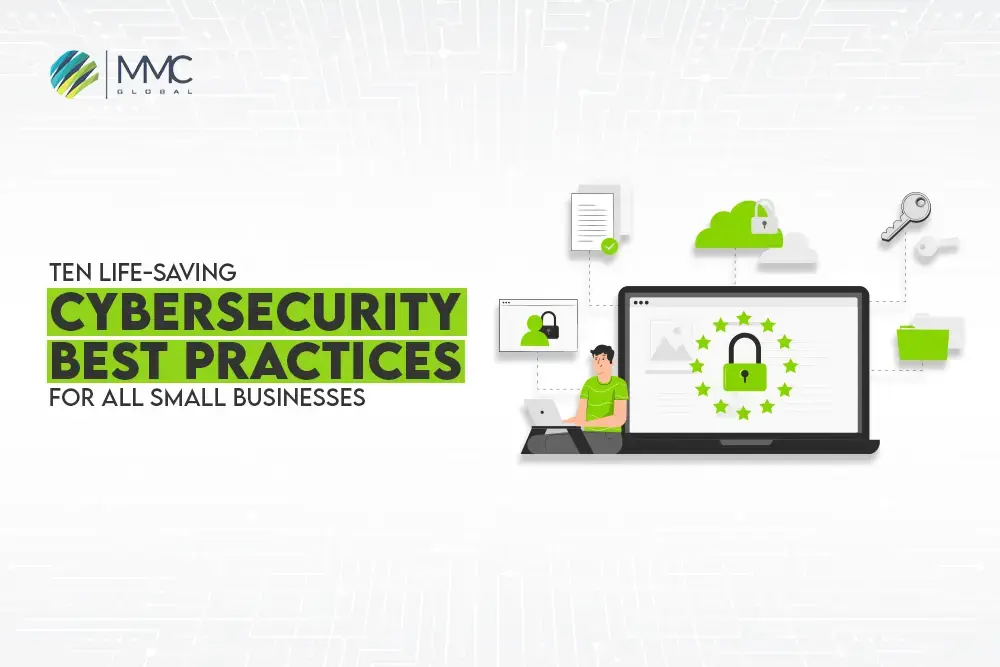Ten life-Saving Cybersecurity Best Practices For All Small Businesses


The study found that small businesses are more accessible to target than established ones. 61% of cyberattacks are launched against small companies, and only 14% of them are prepared to prevent themselves. In small companies, the urge to expand business and generate more profits brings them to the edge of the sword due to the negligence of security issues. This Passover caused them substantial financial loss, causing struggling to build the organization’s reputation and making it hard to make a comeback in business continuity. Adopting cybersecurity best practices should be the priority of small and medium-sized businesses to mitigate the risk of cyberattacks and cyber threats.
Implementing robust digital solutions in organizations will help you enhance efficiency, maximize production, and mitigate errors. However, your digital solution can adversely affect your business without adequate security. Cybersecurity and financial loss are two primary reasons behind the failure of most small businesses. A recent study by IBM found that organizations with fewer than 500 employees had an average data breach cost of $2.98 million per incident in 2021.
Incorporating cybersecurity best practices for small businesses is prevalent to provide a protective shield from vulnerabilities, malware attacks, and other malicious activities. In this article, you will learn about cybersecurity best practices that can be implemented into your small business for alpha progress.
10 Cybersecurity Best Practices For Small Businesses
Security Assessment
A dedicated team of security analysts will be a key resource to the organization when conducting security assessments. They help you conduct a complete security audit and create an analysis report to uncover diverse blind spots that become threats. Moreover, security assessments in small businesses can be a life-saving hack to ensure your security infrastructure.
Strong Identity Access Management
Identity access management is one of the most functional cybersecurity best practices. It can enhance the overall security strength of digital assets by controlling accessibility and user roles. Implementing IAM can help prevent unauthorized access by attackers and save the organization’s sensitive information. Techniques like multi-factor authentication, single sign-on, and strong passwords promote impeccable cybersecurity posters.
Employee Cybersecurity Training
In small businesses, cybersecurity training can help spread awareness among the employees to avoid any trap from attackers. With the help of a cybersecurity training program, you can empower your workforce to monitor, identify, and respond as soon as it is noticed. At MMC Global, we offer IT security training programs on diverse topics in the domain of user awareness training, mobile application security training, infrastructure security training, and network security training.
Control Access To the Company’s Data
Limiting user access to specific digital solutions helps protect against data breaches. Employees should only have access to the data and systems necessary for their job roles. Effective governance and administration are crucial for monitoring and managing access. For example, revoking credentials from departing employees is essential to prevent unauthorized access and maintain security.
Backup Your Data
Always prepare for a cybersecurity incident by setting up your backup plan. One of the most essential cybersecurity best practices for small businesses is to maintain a backup file regularly to mitigate the risk of any loss. By taking a proactive approach, you can save your organization’s critical data, which may include Word documents, databases, spreadsheets, employee documentation, financial plans and reports, and accounts receivable/payable files. Back up your data daily (if possible) or at least once a week.
On-Time Software Update
Hackers continuously monitor your software solutions for scanning and vulnerability. Once detected, they will not take a minute to launch an attack. To minimize this risk, small businesses need to update their software promptly. This will help your device perform efficiently and improve security, decreasing the chance of getting trapped.
Prepare Incident Response Plan
Timely response to cybersecurity incidents is another best cybersecurity practice that surely helps prevent big losses. Organizations develop effective strategies for incident response and train their workforce to take quick action. As soon as an incident evolves, your team will always be ready to combat all endpoints before hackers gain access.
Secure Payment Processing
Small businesses that process online payments have a responsibility to provide trusted and secure payment gateways. Integrating secure payment gateways that meet security compliance is one of the key cybersecurity best practices and approaches to mitigate the risk of burglary and vulnerability issues. However, payment gateways compliant with PCI DSS are highly recommended for secure transactions.
Implement Formal Security Policies
To stay compliant with standardized security compliance and regulations, a dedicated team of cybersecurity experts must help teams understand different rules. Compliance including HIPAA, PCI DSS, ISO 27001, SOC2, HITRUST CSF, etc., is very significant to understand. Moreover, you can outsource your cybersecurity experts to help you understand, implement, and update all security policies that meet regulations and abstain from unnecessary fines and penalties.
Secure Your Network
Using firewall implementation, you can secure your network from anomalies and malware. A firewall monitors and detects the incoming and outgoing network traffic. However, remember to turn on the Windows 10 firewall. Many network service providers have installed firewall features protecting routers and other internet devices. Secure your Wi-Fi devices with a password and hide your Wi-Fi network to set up a router or wireless access point so it does not broadcast the name of your network.
Ready To Implement Cybersecurity Best Practices?
MMC Global provides futuristic cybersecurity modules that can save diverse digital assets and not exploit your critical information. We encourage small organizations to invest in cybersecurity to create a safe and secure environment for business operations and associated stakeholders, including customers. We offer various cybersecurity services, solutions, as well as training that make an organization stand out. If you want to implement cybersecurity best practices, it’s time to connect with us before facing security challenges!



